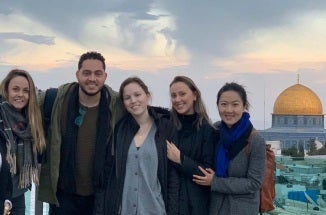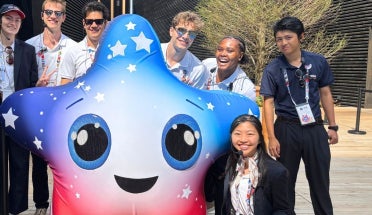
Students Flourish in Unique Environment of Global Career Launch
- Mar 10, 2022
- Education Abroad
- by Alex Briseño
Students from The University of Texas at Austin are researching wildlife recovery, exploring democratic political participation, searching for sustainable substitutes in the fashion industry and much more through Global Career Launch (GCL). In locations as far-flung as Botswana, Finland, Guatemala, Portugal and many other countries across the world, participants of the GCL program engage in unique, hands-on internships and research initiatives around the world, courtesy of the university’s comprehensive internship network of transnational partners.
Launched by Texas Global in 2020, GCL began to strategically grow UT Austin’s international internship options while supporting prospective students and directors with funding and advising. The range of options ensures high-impact, in-country work across a multiplicity of fields.
“Global Career Launch is an exemplary program for its relevance to the career objectives of participating students,” said Sonia Feigenbaum, senior vice provost for global engagement and chief international officer. “The program design supports faculty in cultivating their connections with organizations and universities worldwide, while at the same time expanding international specialized internship and research opportunities for UT Austin students.”
Development of the GCL program in its first two years has resulted in an innovative set of opportunities. In many cases, students gain global research or work exposure in settings tailored toward their career goals. However, interdisciplinarity is also encouraged, so students are not required to pursue an opportunity within their academic field of study.
Recent GCL cohorts have garnered in-depth work opportunities with partners in Brazil, Denmark, Israel, Mexico and Thailand, among others.
Projects slated for 2022-23 include enhancing health, gender and equality in Finland; engaging in wildlife recovery research in Botswana; connecting women to employment, education and entrepreneurial opportunities in Guatemala; and implementing operations, marketing and research strategies with local businesses in Mexico to help them thrive nationally and internationally.
Students who participate in a GCL cohort are automatically eligible for a scholarship of up to $4,000. Faculty directors, who oversee up to 10 students per cohort, receive a $5,000 stipend in addition to a $2,000 travel grant.
"It is so rewarding as an educator to see how the Global Career [Launch] Award changed the lives of my students for the better,” said Professor Jessica Ciarla, M.A., faculty leader for the Denmark cohort who explored sustainable alternative materials in the fashion industry at the Copenhagen School of Design and Technology (KEA).
Texas Global will award up to 10 grants to faculty directors for this cycle, with 15 projects already funded to date.
Texas Global has provided over $400,000 to date to support student GCL internships. These scholarships help students cover expenses and support their activities abroad.
Pivoting with Precautions
Just as the GCL program launched, COVID-19 started triggering shutdowns across the globe. Cohorts adjusted to the changing health precautions, though, still managing to pick up skills and knowledge that translated beyond borders in their unique in-person, virtual and hybrid work.
Hirofumi Tanaka, Ph.D., a professor and director of the Cardiovascular Aging Research Laboratory at UT Austin, partnered with the leader of the exercise physiology program at Chulalongkorn University in Bangkok, Thailand.
Tanaka’s cohort worked alongside fellow students and faculty at Chulalongkorn’s cutting-edge exercise physiology laboratory, where they ran fitness evaluation tests to help broaden the understanding of physical fitness and athletic performance in transgender adults. But first, they needed to gain entry into Thailand, which proved difficult.
“Due to the COVID situation, participating students had to endure a long delay in obtaining a visa, a 14-day quarantine in a hotel room, and a lockdown of the city in Bangkok,” said Tanaka. “They acquired important and unique lessons of perseverance and resilience through this international experience.”
Paving Pathways
As a GCL faculty coordinator, cultural anthropologist Amelia Weinreb, Ph.D., built upon her longstanding research in Israel by partnering with Dr. Reut Barak Weekes, the academic head of the Global International Development Program at Hebrew University in Jerusalem.
With an interest in community development, Weinreb helped create opportunities for UT Austin students to assist Hebrew University affiliates with projects in urban planning and design, affecting local organizations and social movements, and business and the economy.
After initially designing an in-country program based in Jerusalem, however, Weinreb found that Israel’s border closures to non-citizens required the cohort to pivot plans and conduct the program virtually for the duration of the program.
“My experience was initially intended to be much more focused on examining different community organizations,” said one student. “But it transitioned into something much more focused on the study of the peacebuilding field.”
Despite the challenges, Weinreb says her group still found success in their virtual plan.
“The most meaningful part of the GCL is to watch the personal and professional connections that bloomed over the course of our 10 weeks together during the Contemporary Jerusalem research internship,” said Weinreb. “I was so gratified that many of the relationships will continue well beyond the GCL period.”
The program successfully established warm, sustainable relationships between UT Austin students and their Hebrew University supervisors, she added. Even under the constraints of working remotely, students from both UT Austin and Hebrew University found ways to make their participation enriching and valuable.
“I think I learned a lot of contextual and situational information about life in Israel that I hadn't gotten from my classes,” said one student. “For me, this showed that there is a lot to be gained and learned from people and hearing their stories that cannot be learned from a classroom and textbooks.”
Another research intern, Emma Hofmann, was accepted to the M.A. program in international development at Hebrew University after forming connections during the program.
“This is a testament to the direct bridge the program builds between UT and Hebrew U and the career pathways it opens,” Weinreb said.
Gaining Confidence
As a fashion designer with more than 14 years of experience in the industry, Ciarla looked to deepen a previously formed partnership with KEA in Denmark.
Conducting research on sustainable product design, Ciarla helped provide students the opportunity to investigate sustainable material development and design methods with faculty and designers in Copenhagen.
After starting their project virtually, Ciarla’s cohort then traveled to Denmark to spend the final two weeks of the internship in-country. There, in search of potential alternative options for the fashion industry, students worked with KEA on developing textile and apparel materials that are easily recycled or broken down.
“The international partnership with KEA in Copenhagen has allowed my students to gain the confidence to pursue their passions and take on student‐led projects without hesitation,” said Ciarla. “I was able to step back and watch my students take the lead in a new country and advance the teachings they gained at UT on an international platform."
GCL will continue providing unique opportunities in 2022 and beyond, with support of up to 100 students set for this summer.



